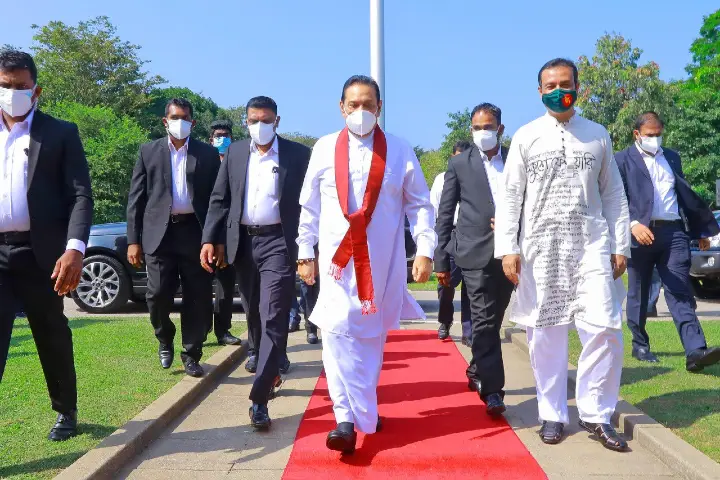The situation in Sri Lanka continues to be volatile after irate protestors tried to storm Prime Minister Mahinda Rajapaksa’s residence on Monday evening. The police used tear gas and water cannons to push back the angry crowd.
This was similar to the situation last week when people, furious with the food and fuel shortages, tried to storm President Gotabaya Rajapaksa’s residence on Thursday midnight, leading to violence and a curfew.
Sri Lankans have been protesting over the unavailability of food and fuel for the past many weeks, as the island nation has stopped imports due to negligible foreign exchange. The forex crisis, building up for the past many months, has resulted in serpentine queues for fuel, soaring food costs, long power outages and unavailability of medicines.

Sri Lankans have taken to the streets to protest against their government (Photo: Daily Mirror)
Last week, many families sailed across to Tamil Nadu, India, from the north western parts of Sri Lanka in a bid to escape economic hardships.
India Narrative spoke with Dhananjaya Tripathi, Assistant Professor, Department of International Relations, South Asian University, about the crisis in Sri Lanka and what India should do.
India needs a humanitarian approach towards Sri Lanka
Tripathi said that the Indian approach should be to help Sri Lanka on a humanitarian basis, exactly the way it is providing humanitarian help to the Afghan people. He said that India should help Sri Lankans on a priority and not let the country fall into the trap of external powers. “We have taken the right approach in Afghanistan by helping the people with food”, adds Tripathi.
“It is a critical moment for Indian diplomacy and also for Sri Lanka. India should take a short-term and a long-term view regarding Sri Lanka. Nobody should blame us for not helping the country, or for hegemonizing the situation there”, says Tripathi.
The Sri Lankan crisis does not bode well for India. “India will face a fall-out through the refugee crisis. It also impacts India’s SAGAR doctrine—Security and Growth for All in the Region, which primarily focuses on Sri Lanka and Maldives among other nations”, says Tripathi.
Formulated by the Narendra Modi government, the SAGAR doctrine lays stress on maritime security, sustainable development, cooperation among nations and economic growth in the Indian Ocean region.
China will protect its projects and returns
The mood in the Indian Ocean nation is turning anti-China. Even though the world had advised caution about the mega projects in Sri Lanka, the Rajapaksa family was rooting for investments from the communist nation. Chinese projects have only added to the country’s woes, pushing it further into debt without giving anything back to the Sri Lankan economy.
If China comes to the rescue of Sri Lanka now, it will be detrimental for India in the long term.
Tripathi says: “China will look at Sri Lanka through the Chinese way of investment. It will be worried about its massive projects. It may even try to put pressure on Colombo to ensure that Chinese investment is protected and it gets its returns”.
“What is the use of mega projects in such a small country. The Hambantota Port, the Colombo Port City project and the Mattala Rajapaksa International Airport (MRIA) are not helping the country’s economy. These are mega projects that looked good for the government and for China, but did not benefit the people. The masses now realise that criticism of these projects was valid”, says Tripathi.
He adds that India’s image has improved considerably among the man on the street who feels that India is a friend indeed.
The Rajapaksa family’s future?
Talking about the powerful Rajapaksa family, Tripathi says that people will hold resentment against the family in the short-term even though the family will stay relevant for a long time.
“Now people are beginning to feel that the family has failed to deliver on its promises. Sri Lanka enjoyed the best human development indicators (HDI) in South Asia till now. Covid-19 and tourism did impact Sri Lanka, but the country is facing a crisis because no gainful economic activity took off in the country despite large investments”, says Tripathi.
Read More:
Amidst emergency in Sri Lanka, India rubbishes rumours about troop deployments in the island nation
Forex crisis may lead to closure of Sri Lanka's only oil refinery unless India steps in
Sri Lanka asks China's Wang Yi to restructure debt, aid industry through concessional trade schemes




















